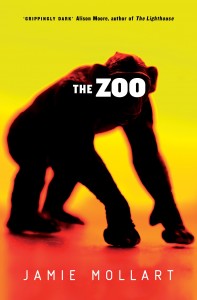 Published by Sandstone Press 16 April 2015
Published by Sandstone Press 16 April 2015
320pp, paperback, £8.99
Reviewed by Elizabeth Hilliard Selka
James Marlowe is an advertising executive – a successful one whose latest triumph is a prestigious deal with a Dutch bank for a new campaign. He has a great team at the office and at home a lovely wife, Sally, and their beautiful little boy, Harry. It all sounds good news for James, given that advertising is his business. But as we know from the first words of this novel, James is a wreck. He’s somewhere else, far removed from the world of work and family, in a place where his whole being is focused on a collection of toy figures made from plastic and metal in forms including a cowboy, a knight and a pirate… The Zoo. James is psychotic, committed to a secure unit where The Zoo both provides his only tentative connection with reality and sanity and at the same time drives him crazy as he tries to grasp the roles and significance of the various pieces. As the plot spools out between the one extreme and the other, high-pressure business and high-security unit, we see James become the drunken, drugged-up, self-hating and hateful man whose final act of self-mutilating violence is the cause of his commitment.
Put like that, The Zoo hardly sounds like a book one would want to spend time with. But don’t be put off. There is a redeeming feature to the plot involving the fictitious African country of Nghosa, where the black minerals casserite and coltan are mined – minerals essential for the manufacture of the sort of electronic goods of which we in the West can’t seem to consume enough. But they are obtained by child labour and are so valuable that a rebel army is prepared to brutalize, rape and mutilate the country’s population in order to wrest control of the material and its trade from the government. James only gradually becomes aware of this, so befuddled is he by his vast consumption of champagne and cocaine. His wife’s friend Lou has to spell out to him – and thankfully to us – both the situation in Nghosa and its connection to James himself in interludes which give the reader welcome clarification of what is otherwise only hinted at obliquely. At the climax of the novel, in dramatic if fantastical interventions (does every advertising agency have a meat cleaver in its kitchen drawer?), James tries to make everything right, or at least make his own atonement for his part in perpetuating the horror in Nghosa. Thus the various threads weave together in the end in a satisfactory manner.
The challenge presented by The Zoo is that pre-psychosis James is such an idiot. He is his own worst enemy, glugging more alcohol and sniffing yet more coke, lying yet again to his wife and yelling at his beloved son, to such as extent that one questions why he goes on and on doing it when – and this is James’s one redeeming feature – he seems to know in his heart that it’s all a very bad idea. Perhaps that is the nature of addiction, in which case The Zoo gives a convincing portrait of this form of compulsion. And the psychotic episodes are credible, even sometimes engrossing. But not so appealing that we want James to be left in his alternative universe for any longer than necessary. And in the end, it is The Zoo itself which helps him drag himself back to join our reality, to Sally and Harry. The journey may be somewhat exhausting, but it feels worthwhile, and we don’t lose hope that there will be a happy ending to this human and psychological thriller.
